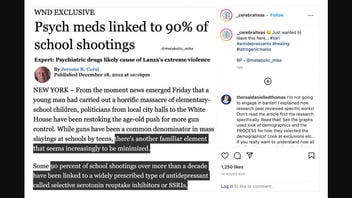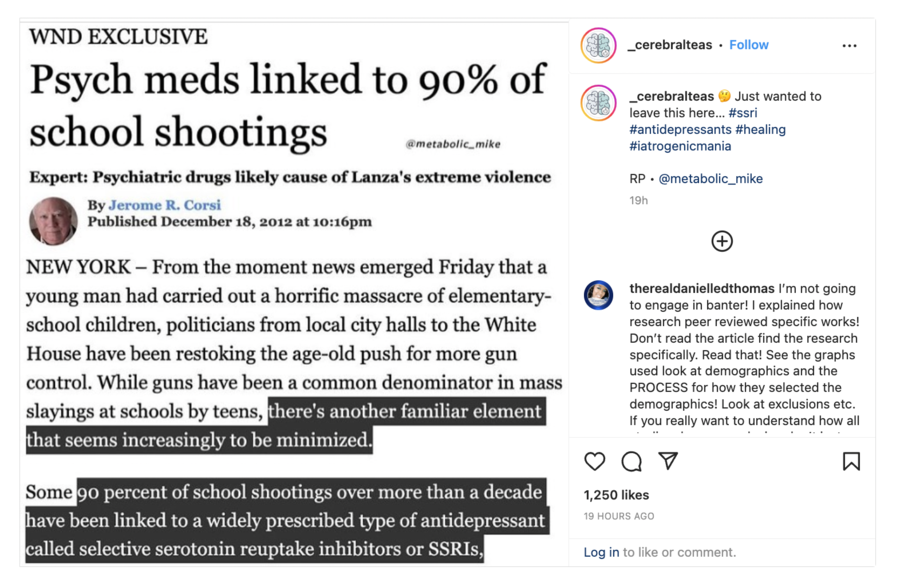
Are school shootings proven to be caused predominantly by the attackers taking antidepressants? No, that's not true: No credible source has confirmed this claim since it was published in 2012.
The claim reappeared in a post on Instagram on March 30, 2023. The caption said:
🤔 Just wanted to leave this here... #ssri #antidepressants #healing #iatrogenicmania
An article shared in the attached picture included:
90 percent of school shootings over more than a decade have been linked to a widely prescribed type of antidepressant called selective serotonin reuptake inhibitors or SSRIs.
Here is what it looked like at the time of the writing of this fact check:
 (Source: Instagram (Screenshot taken on Fri Mar 31 14:05:11 2023 UTC)
(Source: Instagram (Screenshot taken on Fri Mar 31 14:05:11 2023 UTC)
The image in the post showed a 2012 article published by WND (formerly WorldNetDaily, founded in 1997), one of the oldest websites spreading conspiracy theories. For example, WND promoted false claims about former President Barack Obama's birth certificate, and its articles were listed as "sources" for COVID-related misinformation during the pandemic.
The WND article cited British psychiatrist David Healy, known for promoting the theory that antidepressants may increase suicidal thoughts and cause violent behavior. Healy's take did not receive much support from the international academic community and was widely recognized as controversial.
In 2005, The New York Times reported that in most of the cases Healy had evaluated as an expert witness, the psychiatrist had "concluded that the drug did not contribute to violent behavior." Healy "acknowledges that antidepressants often work well," and "prescribes them in his own practice," the article noted.
In 2018, the claim appeared to have been amplified by the Citizens Commission on Human Rights, a group affiliated with the Church of Scientology and known for supporting conspiracy theories. The group published a report that claimed that SSRIs "are documented to be linked to violent effects in a percentage of the people taking them."
However, the report largely discussed the general side effects and withdrawal effects of these antidepressants and only presented 24 cases (on pages 28-29) in which attackers were allegedly on medication, thereby conflating the data of murderers and mass shooters.
In a 2016 article posted on his School Shooters.info site, Peter Langman, a U.S. psychologist specializing in understanding school shootings and prevention, found that only 12.5 percent of his sample of 48 shooters were on psychiatric medications at the time of attacking an educational institution.
At the societal level, the argument that the rise in the use of psychiatric drugs has caused a corresponding rise in violence and homicide does not hold water for the simple fact that there has been no corresponding rise in violence and homicide. Just the opposite. Over a twenty-year period, violent crime in general and homicides by youths in particular decreased significantly. Medications cannot be blamed for a crisis of 'mania, murder and mayhem' because there is no such crisis.
The argument at the level of individual shooters is damaged by the frequent errors made by people espousing their views, including inaccurate claims about which shooters took medications, whether they were on medications at the time of their attacks, and the effects the medications actually had on them.
The concern about adverse effects of psychiatric medications is a legitimate concern and worthy of ongoing research. This concern, however, is not well served by assumptions, misinformation, and innuendo in the place of facts.
No such information exists for most mass shootings, according to a 2019 study, published by the peer-reviewed Behavioral Sciences & the Law. The study described the purported link between violence and prescribed drugs as a "myth."
Lead Stories contacted licensed psychiatrists for additional feedback about the claim about antidepressants and school shootings. If they respond, we will update this fact check as appropriate.
Other Lead Stories fact checks of claims about mass shootings can be found here.

















